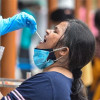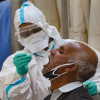
 Dr. G. Sengottuvelu
Dr. G. Sengottuvelu
COVID-19 in heart and Blood Pressure patient
COVID-19 has emerged as the worst global pandemic witnessed in the modern age. Despite its rapid spread across 200+ countries in the world, majority of COVID-19 patients only experience mild illness such as cough, fever, body aches and sometimes, soreness in throat.
How COVID-19 affects human body
Only a fraction (up to 5%) of the people experience life-threatening conditions. According to observations, there are certain specific age-groups or categories of people who are more vulnerable to the viral infection.
how COVID-19 effect blood pressure Patients?
A look at the data from China and Italy, two of the countries where community spread of the pandemic was first witnessed, reveals that the risk of infection and complications was higher among blood pressure patients.
In Italy, 76% of the dead had a history of high blood pressure. It is estimated that high blood pressure increases the possibility of COVID-19 fatality by about 6% compared to normal people.
The risk to blood pressure patients is enhanced by their weak immune system. Aging coupled with a history of high blood pressure reduces the body’s ability to fight the Coronavirus. It is observed that almost two-thirds of people above 60 years of age suffer from high blood pressure. There is also the likelihood of the risk posed by high blood pressure medicines. According to some researchers, ACE inhibitors and ARBs (medications for high blood pressure) cause increase in an enzyme called ACE2 in he body. ACE2 is the same protein that the COVID-19 virus attaches itself with.
Upon entering the body, the virus first causes inflammation of the airways. This causes irritation of the nerves and causes cough. With worsening of the infection, the patient starts suffering lung damage and the capacity of the lungs to distribute fresh oxygen supply to the bloodstream reduces. Eventually oxygen levels in the blood go down and the heart needs to beat harder and faster to ensure oxygen supply to various organs. Simultaneously, the body’s immune system starts attacking the virus which causes whole-body inflammation. Blood pressure starts going down and that again puts stress on the heart to work harder and maintain oxygen supply to various organs like kidney, liver etc. This leads to a severe impact on the heart in such cases.
why COVID-19 impact on heart?
Just like high blood pressure, heart diseases are also considered co-morbidity conditions in COVID-19 patients. Thus, heart patients are considered to be highly vulnerable to severe coronavirus infection.
• Patients who had undergone any transplant, especially a heart transplant.
• Pregnant ladies with major heart problems such as coronary heart disease, hypertrophic cardiomyopathy, pulmonary arterial hypertension, heart valve problems or congenital heart disease etc.
There is some evidence that Covid-19 can lead to myocarditis (inflammation of the heart muscle) or pericarditis (inflammation of the protective layer around the heart).
Severe Covid-19 infections can cause whole-body inflammation. We know this can make heart rhythm problems worse or even cause new ones. Feeling like your heart is racing or going faster than normal can be a symptom of many infections. It can also be a common symptom of anxiety, and many people are feeling anxious at the current time.

Dr. G. Sengottuvelu
Dr. G. Sengottuvelu is a Senior Consultant & Interventional Cardiologist at Apollo Hospitals, Greams Road, Chennai. He is an accomplished leader in complex PCI & stenting, and structural heart interventions including percutaneous heart valve replacement & repair (TAVI / TAVR, mitral clip etc.). He also offers consulting at Dr G.S. Heart Clinic in T. Nagar, Chennai. He graduated from the prestigious Madras Medical College, followed by Internal Medicine from Kasturba Medical College, Manipal, and then did his post-graduation in Cardiology at Sri Ramachandra University in Chennai.








Please login to comment on this article